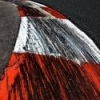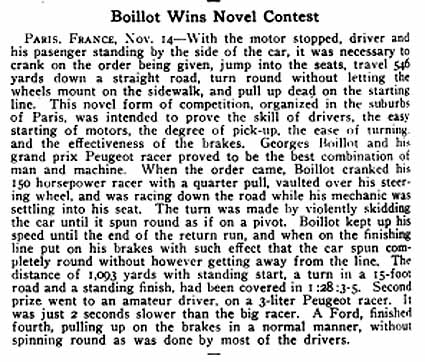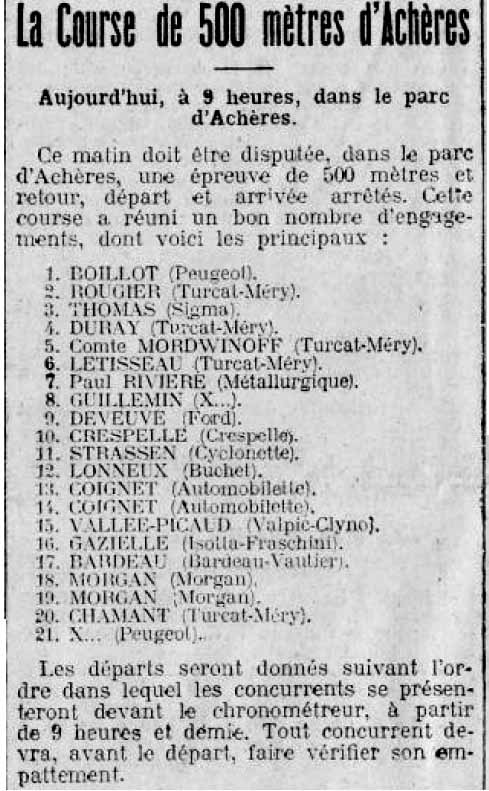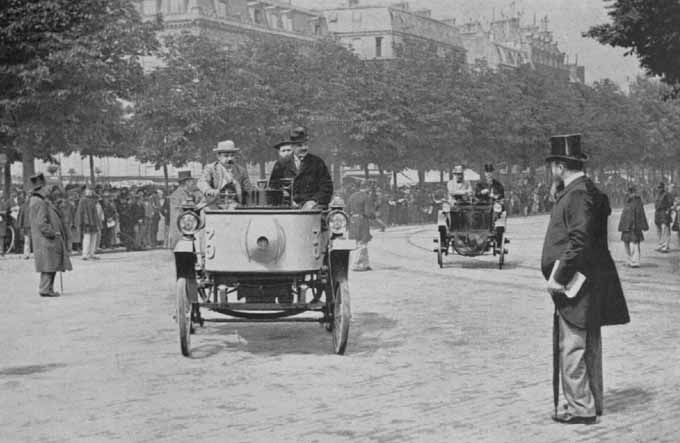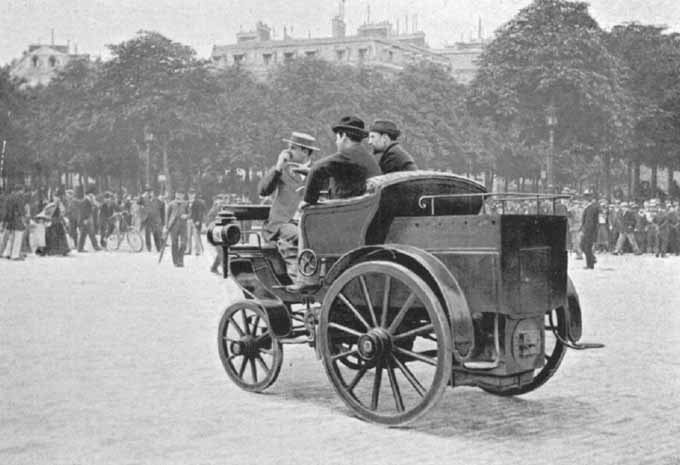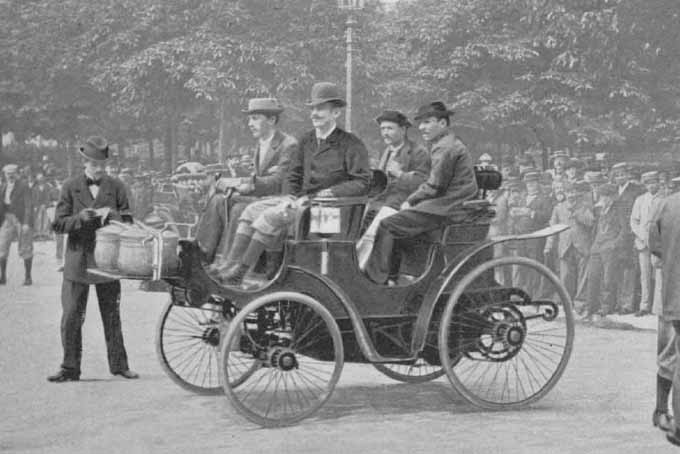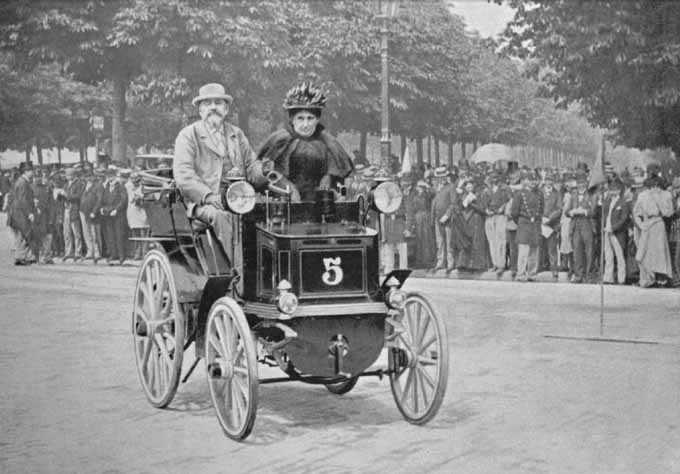1909
Targa Florio (May 2, 1909), Grande Circuit.
Francesco Ciuppa won the race at an average speed of 54.6 km/h. I see a note referring a crisis in motorsport. Certainly, the number of races has dropped off. This represents a point of study.
Vanderbilt Cup Race (October 30, 1909), Long Island, New York.
“Stock-Chassis” racing was in vogue and the Vanderbilt Cup Race rules followed suit.
1910
Targa Florio (May 15, 1910), Madonie.
American Grand Prize (November 12, 1910), Savannah, Georgia.
This may be a useful place to look at the rival organizations of “Triple A” (American Automobile Association) and the Automobile Club of America (who organized the prior American Grand Prize. American David Bruce-Brown won the 24 lap race in a Benz.
Vanderbilt Cupo Race (October 1, 1910), Long Island New York.
Another “Stock-Car” contest, this was the last Vanderbilt Cup Race to be run in Long Island. Thereafter, the race shifted to Savannah.
1911
Targa Florio (May 14, 1911), Madonie.
Indy 500 (May 30, 1911), Indianapolis, Indiana.
The inaugural Indy 500. Vanderbiltcupraces.com has a wealth of information.
Grand Prix de France (July 23, 1911), Le Mans.
The race was won by Victor Hémery in a FIAT.
Vanderbilt Cup Race (November 27, 1911), Savannah and Effingham, Georgia.
The first of the Vanderbilt races held in Georgia. The race was run within a few days of the American Grand Prize.
American Grand Prize (November 30, 1911), Savannah, Georgia.
This race was held three days after the Vanderbilt Cup. David Bruce-Brown won the race in a FIAT.
1912
Indy 500 (May 30, 1912), Indianapolis, Indiana.
Rule changes in the second Indy 500 made riding mechanics necessary. The race purse doubled from the year before to a considerable $50,000.
Grand Prix l’ACF (July 25, 1912 to July 26, 1912), Dieppe.
The GP l’ACF returned after an absence since 1908. The particular reasons for this are outlined by David Hodges in The French Grand Prix: 1906-1966 (Temple Books Press, 1967).
Coupe de la Sarthe (September 9, 2012), Le Mans.
There appears to be an excellent AUTOSPORT TNF post on this.
Vanderbilt Cup Race (October 2, 1912), Milwaukee, Wisconsin.
Mercedes finally won a Vanderbilt Cup Race; however, it was the smallest field ever. If current day Milwaukee is any indication, it is no surprise that the international crowd avoided the hopsy industrial malaise.
American Grand Prize (October 5, 1912), Milwaukee, Wisconsin.
The event was marred by the deat of two time and defending winner David Bruce-Brown in a practice accident.
1913
Indy 500 (May 30, 1913) , Indianapolis, Indiana
The race was won by a champagne-consuming Frenchman—Jules Goux—driving a Peugot (where is father was the factory Supervisor).
Grand Prix l’ACF (July 12, 1913), Amiens.
In David Hodges book, The French Grand Prix, the winner Georges Boillot was quoted as saying, “I finished, glad to have had the honor of winning the Grand Prix for the second year in succession.’ This victory brought him ‘hero status’ in France.
1914
Vanderbilt Cup Race (February 27, 1914), Santa Monica, California.sy.com
American Grand Prize (February 28, 1914), Santa Monica, California.
48 lap race run on public roads in Santa Monica. The Vanderbilt Cup was run on the same track two days prior.
Indy 500 (May 30, 1914), Indianapolis 500.
René Thomas and his riding mechanic Robert Laly won the race.
Coppa Florio (May 31, 1914), Circuito Grande, Italy.
It appears, though I have not yet confirmed, that the C.F. had not been run since the Fall of 1908. In any event, the 1908 winner of the race, Felice Nazzaro, won the race again.
Grand Prix l’ACF (July 4, 1914), Lyon.
To some extent, this race is considered to the final event of motorsport’s first epoch. (Hodges at 45).
World War I (July 28, 1914).
Archduke Franz Ferdinand of Austria, heir to the throne of Austria-Hungary, is assassinated. This triggers a chilling diplomatic cluster____. The context, nuances, and rather strange events that occurred on this day are outlined in an article/segment, which aired on National Public Radio (npr.org) on June 27, 2014, titled “The Shifting Legacy of the Man Who Shot Franz Ferdinand.”





